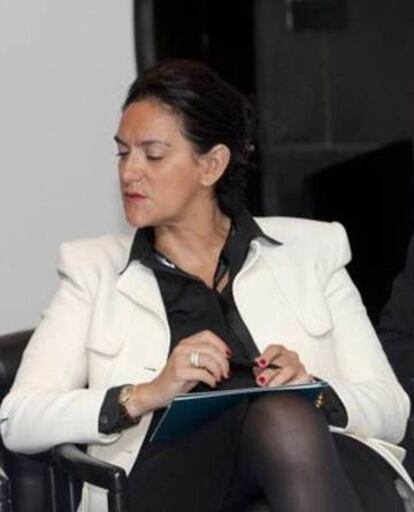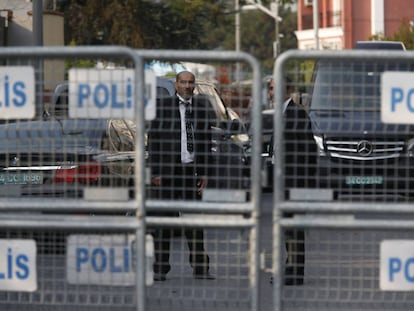Spanish High Court probes 23 years of bribery in arms sales to Saudi Arabia
State-owned company Defex is accused of paying millions in illegal commission to secure weapons contracts

Spain¡¯s High Court, the Audiencia Nacional, is investigating 23 years¡¯ worth of arms sales to Saudi Arabia during which executives at a state-owned company allegedly paid millions in bribes to secure contracts.
Judge Jos¨¦ de la Mata is examining five transactions made from 1992 to 2004 between Riyadh and a company named Defex, as well as 11 other contracts signed between 2005 and 2014, according to Spanish and Swiss legal documents that EL PA?S has seen.
S¨¢nchez in Congress
Speaking in Congress on Wednesday morning, Spanish Prime Minister Pedro S¨¢nchez defended his government¡¯s decision to go ahead with a controversial sale of guided missiles to Saudi Arabia.
The contract for 400 bombs was signed by the previous Popular Party (PP) administration but the material had still not been delivered when S¨¢nchez became PM in early June. His defense minister attempted to halt the sale, citing concerns that the weapons might be used in the Yemen war, but Riyadh threatened to retaliate by severing all bilateral business ties.
S¨¢nchez said that he is thinking about ¡°the interests of Spaniards¡± and that canceling that sale would have meant losing a €1.8 billion contract to build five warships for Saudi Arabia at the Navantia shipyard in C¨¢diz, affecting 6,000 workers.
His remarks come in the wake of growing international criticism over the death of dissident journalist Jamal Khashoggi at the Saudi consulate in Istanbul.
The company under scrutiny, Defex, is 51% owned by the Spanish state through the holding company SEPI, while the other 49% is in the hands of private businesses whose main activity is arms sales.
Defex has been under investigation since 2014, when a suspicious transaction emerged involving the sale of police equipment to Angola through heavily padded invoices; the extra money was allegedly shared out among government workers in the African country and Spanish company execs.
The investigation into the Saudi arms sales is an offshoot of the Angola scandal, which brought down Defex. The company is currently in liquidation, and its three top officials ¨C the former president, vice-president and chief of operations ¨C are under investigation for keeping up ¡°a systematic criminal behavior pattern¡± for over two decades, according to the judge.
So far, the inquiry has determined that Defex secured 11 contracts to sell weapons or police and defense equipment to Saudi Arabia between 2005 and 2014 by paying illegal commissions. The fact that it was a publicly held company allowed Defex to obtain the necessary permits to export arms and ammunition.
Later, through the creation of a ¡°complex constellation¡± of companies ¨C as defined by Swiss authorities who were queried for information by the High Court ¨C Defex paid illegal commissions in exchange for no apparent commercial service to individuals with good connections to Saudi authorities, and also to Defex executives.

In its letter rogatory ¨C a request for judicial assistance ¨C to Switzerland, the Spanish court focused on a military equipment contract with a Saudi representative worth €19.05 million. The actual value of the material was €14.55 million. Investigators also detected a payment of €7.6 million to a Saudi company for services whose existence there is no evidence of.
Investigators with the Civil Guard¡¯s Central Operative Unit ¨C in charge of serious and organized crime ¨C found five other similar transactions in Saudi Arabia, involving payments by Defex worth a total €60.7 million between 1992 and 2004 to a company named Peninsula Inc Ltd, headquartered in the Cayman Islands. These payments are documented ¡°in various invoices with no description of services and without a contract,¡± as the judge notes.
Shell companies
Investigators believe that Peninsula and at least four other firms are shell companies set up to channel funds to well-connected individuals who could help secure contracts, and to Defex executives; they were also used to conceal the earnings from illegal commissions. The judge thinks that former Defex operations director ?ngel Mar¨ªa Larumbe Burgui and former president Jos¨¦ Ignacio Encinas Charro had been using this system since 1998.
Another target of the investigation is Beatriz Garc¨ªa Paesa, niece of the Spanish spy Francisco Paesa and the alleged mastermind behind a sophisticated financial structure, which she designed from her law firm in Luxembourg in order to facilitate the suspect financial operations.
Liquidation
In April 2017, the board of SEPI agreed to ask the Cabinet for permission to carry out Defex¡¯s voluntary dissolution. The company could no longer operate ¡°as a result of the damage to its reputation¡± and because of ¡°the precautionary measures imposed during the inquiry.¡± In September of that year, the Cabinet approved Defex¡¯s dissolution.
The company nevertheless continued to operate after its dissolution because it had signed earlier commitments. In 2017, it made €805,000 from contracts with Latin America, according to SEPI¡¯s annual accounts. The holding company has refused to clarify Defex¡¯s current situation.
Defex, a cover for the State
A small, state-controlled company with just 15 employees, whose activities take place abroad, and which posts profits year after year, can be useful for many things. For instance, for the kind of jobs that a State might not want to give explanations about. The literature on this matter is varied: payment of ransom money, bribes for foreign government officials...these are some of the theories posited by the people who have investigated Defex¡¯s activities.
Some of the private companies with a stake in Defex include Maxamcorp Holding Assets (12%) and Expal Systems (8%), whose headquarters are in the United States.
The Angola investigation, triggered in 2012 by a warning from Luxembourg authorities to Spain¡¯s anti-corruption prosecutors regarding a suspicious money transfer, revealed suspect operations in Egypt, several South American countries, Asian governments and Gulf nations, including Saudi Arabia.
The most remarkable thing of all is that, being a state company, Defex also had Spanish Tax Agency workers in its midst. Investigators have wondered why the company¡¯s strange transactions did not set off alarm bells among tax officials, or at the Bank of Spain¡¯s anti-money laundering department Sepblac.
What¡¯s more, solicitors representing the Spanish state were remarkably passive, and the defense minister at the time, Pedro Moren¨¦s, put up a lenghty resistance against shutting down the company.
Ultimately, the investigation did not go too far. Some documents included sensitive names and countries ¨C and Saudi Arabia was clearly one of them.
English version by Susana Urra.
Tu suscripci¨®n se est¨¢ usando en otro dispositivo
?Quieres a?adir otro usuario a tu suscripci¨®n?
Si contin¨²as leyendo en este dispositivo, no se podr¨¢ leer en el otro.
FlechaTu suscripci¨®n se est¨¢ usando en otro dispositivo y solo puedes acceder a EL PA?S desde un dispositivo a la vez.
Si quieres compartir tu cuenta, cambia tu suscripci¨®n a la modalidad Premium, as¨ª podr¨¢s a?adir otro usuario. Cada uno acceder¨¢ con su propia cuenta de email, lo que os permitir¨¢ personalizar vuestra experiencia en EL PA?S.
?Tienes una suscripci¨®n de empresa? Accede aqu¨ª para contratar m¨¢s cuentas.
En el caso de no saber qui¨¦n est¨¢ usando tu cuenta, te recomendamos cambiar tu contrase?a aqu¨ª.
Si decides continuar compartiendo tu cuenta, este mensaje se mostrar¨¢ en tu dispositivo y en el de la otra persona que est¨¢ usando tu cuenta de forma indefinida, afectando a tu experiencia de lectura. Puedes consultar aqu¨ª los t¨¦rminos y condiciones de la suscripci¨®n digital.










































